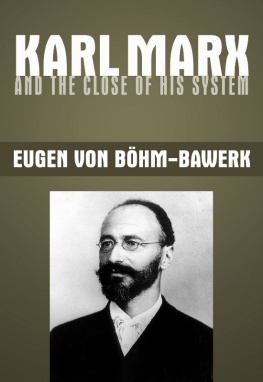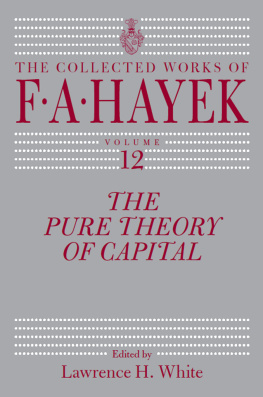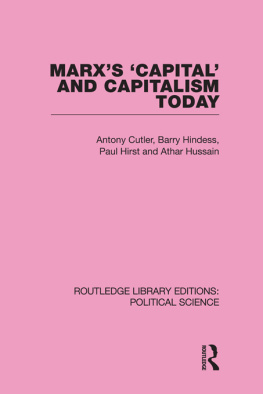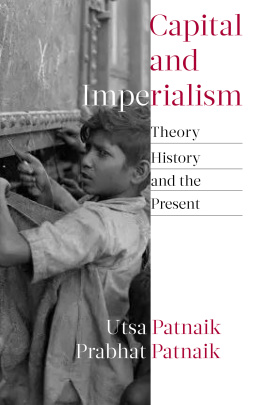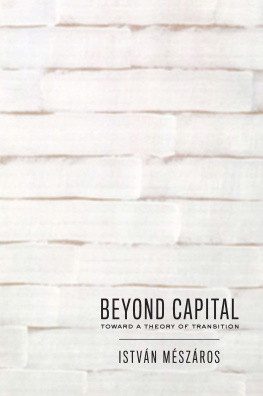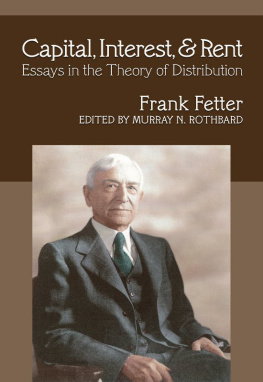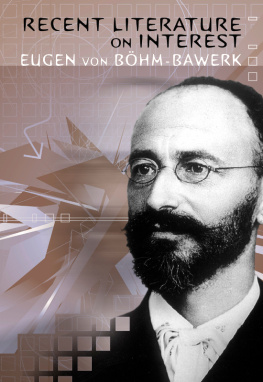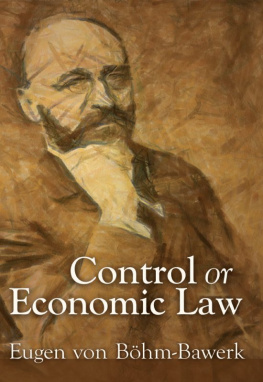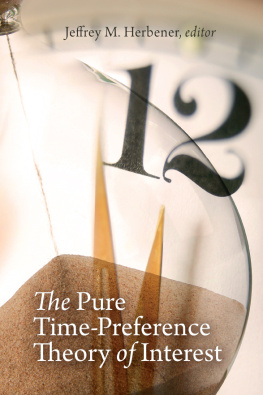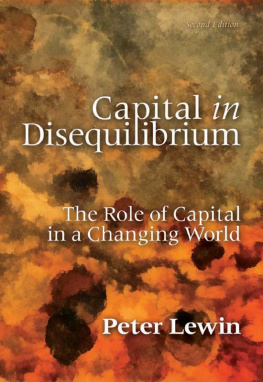THE POSITIVE THEORY OF CAPITAL
THE
POSITIVE THEORY OF CAPITAL
BY
EUGEN V. BHM-BAWEEK
COUNSELLOR IN THE AUSTRIAN MINISTRY OF FINANCE, AND HONORARY PROFESSOR POLITICAL ECONOMY IN THE UNIVERSITY OF VIENNA
TRANSLATED WITH A PREFACE AND ANALYSIS
BY
WILLIAM SMAKT, M.A.
LECTURER ON POLITICAL ECONOMY IN QUEEN MARGARET COLLEGE, GLASGOW
PHOTOGRAPHIC REPRINT
OF THE EDITION OF 1801
1930
G. E. STECHERT & CO.
NEW YORK

PRINTED IN GERMANY
ISBN: 9781610160926
TRANSLATORS PREFACE
IN his Geschichte und Kritik der Kapitalzins-Theorieen (1884), which I translated in 1890 under the title of Capital and Interest, Professor Bhm-Bawerk, after passing in critical review the various opinions, practical and theoretical, held from the earliest times on the subject of interest, ended with the words: On the foundation thus laid, I shall try to find for the vexed problem a solution which invents nothing and assumes nothing, but simply and truly attempts to deduce the phenomena of the formation of interest from the simplest natural and psychological principles of our science. The Positive Theory of Capital, published in Innsbruck in 1888, and here rendered into English, is the fulfilment of that promise.
The criticisms directed against the various theories of Interest in the former work may be briefly summarised as follows.
The Productivity theoriesthose which, more or less explicitly, attribute the existence of interest to the productive power of capitalare dismissed as confusing quantity of product with value of product, either in the way of tacitly assuming the identity of the two, or of failing to show any necessary connection between them. The problem of capital is a problem of surplus value, and value does not come from the side of production but from the side of consumption. Capital is productive, but interest is not its product.
The Use theories, which are a more or less scientific expansion of the familiar formula, Interest is the price paid for the use of capital, are shown to base interest, which is notoriously an income obtained from all kinds of capital, on an analogy drawn from one special kind of capital, viz. durable goods. The idea that the use of capital is something distinct from the using-up of capital, and interest something different from the price of the principal, becomes untenable when the true economic nature of the good is understood as the sum of its material uses or services. If consumption is only a single exhaustive use, and use only a prolonged consumption, the payment for use of Capital must be included in the price of capital.
In the Abstinence theory, which makes interest a compensation, made to the owner of capital, for his renunciation of immediate consumption, Bhm-Bawerk sees a confusion of the origin and accumulation of capital with the source and cause of interest. Abstinence will account for the owner having a sum to lend, but it will not account for that sum growing 3% larger in a years time.
Lastly, the Socialist or Exploitation theory, which makes interest simply a gain from exploited labour, is shown to be a theory which could only arise on the negative basis of the unsatisfactory accounts hitherto given, and on the positive basis of a mistaken value theory. When an income obtained without work and without risk was claimed as the reward of abstinence, and when all value was ascribed to the action of material labourers, it was inevitable that there should rise a reactionary theory proving that interest was robbery. Thus the board was swept clean for the Positive Theory.
A translator who does his duty must pass the work he renders through his own mind. The necessity this imposes on him of understanding his author, and getting at his point of view, should make him peculiarly sensitive to certain difficulties which are not removed by simple translation. Modes of thought, arrangement, manner of working, may remain foreign. A translators preface, then, is not without justification if it anticipates some of the questions that are sure to arise in the minds of readers more accustomed, perhaps, to English economics. Now as the main difficulty of the present work is that alluded to by Professor Bhm-Bawerk in his own Preface, that the strikingly simple outlines of his theory are obscured by the very elaboration and completeness with which it is worked out, perhaps the best service I can do is to give a short direct summary of the main argument, expanding on one or two points which seem to me to require commentary.
Economic science being based on an analysis of the industrial life, the first question in a theory of capital is one of terminology: What does the practical world mean, and what has it hitherto meant, by the word Capital? Here we find in common acceptance not one but two conceptions, both based more or less on Adam Smiths old distinction between National Capital and Individual Capital It is quite necessary for scientific progress that the exact distinction between these two conceptions should be fully recognised, but it would be useless to refuse the name to either of them: the practical world would not follow us. On looking closer at the two, however, we can see that one of the conceptions really includes the other, and that the difficulty may be avoided by adding an appropriate predicate to each. Taking as basis the old root idea of an interest-bearing sum of money, we may define capital in its widest sense (or Acquisitive Capital), as the complex of products destined to the Acquisition of goods. Under this, as narrower category, we put the conception that came later in time but perhaps better deserves the name without predicate, that of Social or Productive Capital, comprising all products destined for the production of fresh wealth; briefly, the complex of Intermediate Products. Thus we happily preserve in both conceptions the popular idea of income bearing: society as a whole can only obtain an income by producing new wealth, while the individual may acquire it as well by the transfer of old wealth.
By these definitions Land and Labour are excluded from capital. They have certain analogies, even close analogies, with it, but scientific accuracy is not gained by making definitions so wide as to conceal really discrepant elements. The definition of Social Capital also excludes the Maintenance of Labourers; for, obviously, to include the direct and most obvious means of living would be to take away all possibility of distinguishing between capital and consumption wealth.
The subject, then, naturally divides itself into two parts:Capital in the narrower, but more widely important, meaning of the Instrument of Production, and Capital as the Source of Income.
First, of the Instrument of Production. In the economical world man finds himself a being of infinite want, confronted with a universe full of potential wealth but with no tools except hands and brains to give him possession of it. Incapable of creating anything, he yet finds himself endowed with a power of moving things, which, as he masters the secrets of natures working, gradually enables him to imprison, impress, or suspend the action of her powers, and so make her his servant In various concrete ways he adapts or rearranges naturenever, of course, changing her laws or acting contrary to them, but varying the causal connection of natural processes in such a way that, to a large extent, he remakes the natural world to suit his purposes. Thus, between man and his natural environment there gradually grows up a third term, a machinery for the fuller satisfaction of mans life, and to this, in general terms, we give the name Capital. But, however the growth of wealth and industry disguise the fact, in all production of wealth there are only two original forces at work, natures powers and mans powers. Human powers, as always limited, and as always put forth at the cost of brain or tissue, are all economic; but in the great treasury of natural forces there are some powers so universal in their scope and working that they do not enter into calculations of cost. As we say, using two phrases whose full significance we do not always realise, we do not economise the free gifts of naturethey cost us nothing; although they enter into the operations of all production, they do not enter into economic consideration. The original factors of production, then, are man and nature: the strictly economic factors of production are labour and those natural forces (called by metonymy Land) which are limited and capable of being monopolised. But Capital, however much credit it gets and deserves for its work in present-day production, is no independent factor alongside of these. In one aspect it may be called stored-up labour, in anotherand more trulynatural force stored up by labour; but in capital itself, alike in its origin and in its working, there is nothing that is not accounted for by the other two factors.


